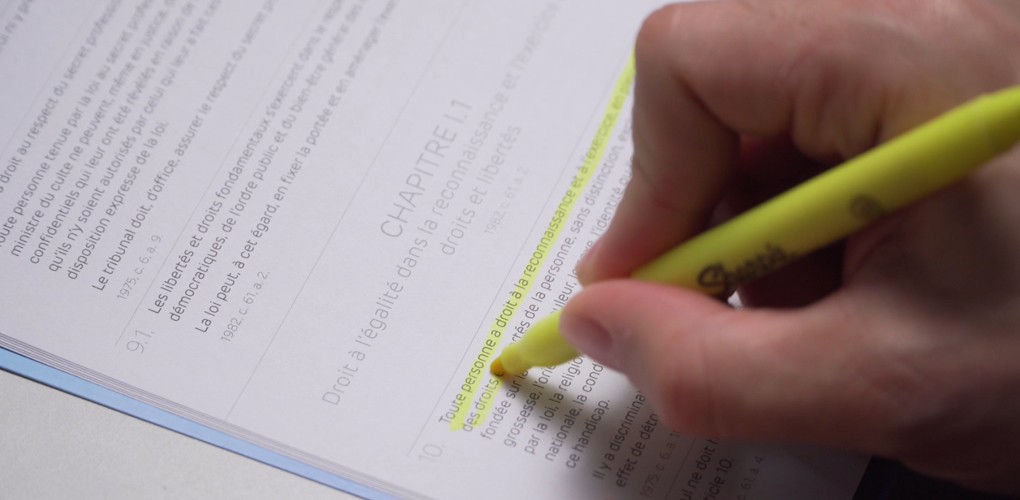Investigations (Human rights)

In processing your complaint, we will first see if you wish to settle your dispute through mediation. If one or both parties (the complainant and/or the respondent) declines mediation, or if mediation fails, then the Commission investigates.
We carry out our investigation in two phases:
- Evaluating the complaint
- Gathering evidence
After the investigation, we submit our findings to the complaints committee to determine whether there is sufficient evidence to support the complaint.
The complaints committee uses our findings to make a decision.
-
When can the Commission investigate?
The Commission can investigate cases of:
- discrimination on the basis one of the grounds prohibited by the Charter
- harassment on the basis of a prohibited ground under the Charter
- exploitation of elderly people or people with a disability
- reprisals
-
When can the Commission decide not to investigate?
The Commission may decide not to investigate if:
- you filed your complaint more than 2 years after the fact OR more than 6 months after the fact if it involves an employee of a police department or municipality
- your complaint is frivolous, vexatious or made in bad faith
- you have pursued another remedy for the same facts, such as through another organization or in court.
-
What is the purpose of the Commission’s investigation?
The purpose of our investigation is to determine:
- If discrimination, discriminatory harassment, exploitation or reprisals can be proven.
- Whether the complainant has suffered material and/or moral consequences.
After our investigation, the Commission determines whether sufficient evidence exists.
If there is sufficient evidence, the Commission may propose corrective measures or may represent the complainant before the Human Rights Tribunal.
Examples of corrective measures
The Commission may ask a respondent to reinstate a victim who lost their job, may suggest discrimination awareness training or may award material, moral or punitive damages for the victim.
The Commission may also decide not to represent the complainant before the Tribunal, even if there is sufficient evidence. In this case, the Commission “ceases to act” and complainants may take their case to the Human Rights Tribunal at their own expense.
If our investigation does not reveal sufficient evidence, then the Commission closes the file. The complainant can then take their case to the civil courts at their own expense.
Learn more about court representation
Learn more about ceasing to act
-
How does the investigation take place?
1. The investigator
- Communicates with the complainant and the respondent (the ‘parties’), and with any witnesses, to gather everyone’s version of what happened. This communication can be done by phone, email or in person depending on the circumstances.
These people may be assisted by a lawyer or another person of their choice. - Gathers the information and documents that we need to analyse the situation.
- May propose to reach an agreement at any time.
- Writes a report summarizing the evidence and presents it to the parties for their feedback.
- Submits the report to the complaints Committee.
2. The complaints Committee, made up of three commissioners
- Reviews and analyzes the investigator’s report to determine whether there exists sufficient evidence of discrimination, discriminatory harassment, exploitation or reprisals. The Committee’s decision is called a resolution, and is sent to the parties.
- If the committee finds that the evidence is sufficient, it then determines the appropriate remedies. Remedies could include requiring the respondent to:
- put an end to the behaviour
- pay compensation
- change their practices
- The Commission will set a deadline for the respondent to implement these remedies. If the respondent does not do so in time, then the Commission may ask the courts, including the Human Rights Tribunal, to enforce these measures.
- The Commission represents complainants in court at no cost.
- In certain circumstances, the Commission may decide not to apply to the Human Rights Tribunal.
- Communicates with the complainant and the respondent (the ‘parties’), and with any witnesses, to gather everyone’s version of what happened. This communication can be done by phone, email or in person depending on the circumstances.
Example of an investigation
Discrimination in hiring
Ilene experienced discrimination because she has children.
Ilene is a 31-year-old mother of two. She was denied a job because she has young children. The Commission’s investigation established that Ilene had experienced discrimination on the basis of her civil status (the fact that she was a mother).
Read her story(French only)
